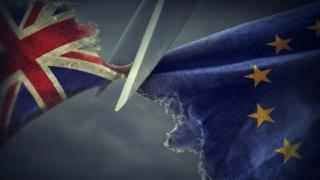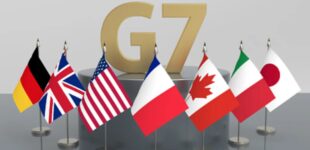What might a post-Brexit EU look like?
 Image copyright Getty Images
Image copyright Getty Images Brexit. It's all about Britain, right?
Well, not entirely.
There is the rest of the club to consider - what has become known, rather inelegantly, as the EU-of-27.
They are about to lose - depending on your point of view - a curmudgeonly whinger who was dragging the whole project down or one of their largest economies and the most powerful defence and security power in Europe.
So what to do?
There are those who think, genuinely, good riddance.
"General de Gaulle was right all along," they mutter. "We should never have let them join in the first place.
"Freed from the shackles of British ministers objecting to integration here and integration there, we can get on with it."
Closer co-operation on EU defence policy is high on their list; and it has been given an extra boost by the new president of the United States musing out loud about Nato and whether it is all worth it.
Others are dismayed by the British decision to leave, but after getting over the initial shock - and it really was a shock - they too are determined to make the best of it.
And when it comes to negotiating the UK divorce bill, make no mistake. For the people who matter, the unity of the remaining 27 is more important than trying not to upset the Brits as they wave goodbye.
The bill will be big - up to 60 billion euros - and European diplomats are bracing themselves for what one called "the very real possibility" that the UK will walk out in a huff.
But the likelihood is that after one too many late-night summits - and one too many outraged tabloid headlines - a deal of sorts will emerge from the rubble.
The consequences of Brexit will rumble on for years; there are trade deals that will have to be done. But the EU is in no position to wait for the dust to settle.
In many ways, it has already moved on. So long Britain, and thanks for the memories.
Later this month, leaders of the 27 (the 28th has already sent her apologies) will meet in Rome to celebrate the 60th anniversary of the EU's founding treaty.
I say celebrate, but there is no illusion about the challenges facing the union.
Could the forces that prompted Brexit spread to other countries? Will anti-EU populists continue to rise in France, the Netherlands and parts of Central Europe?
It is certainly not impossible, and EU leaders know it. The idea that the EU could fall apart - unthinkable a few years ago - is now the subject of serious discussion.
Which is why they need a new plan to reinvigorate the project on its 60th birthday, and make it fit for future purpose.
The European Commission has now produced a series of policy options for the best way forward, ranging from shrugging its shoulders to throwing up its hands in horror.
But the most likely solution is to make more use of what is known as multi-speed Europe.
That's the idea that "coalitions of the willing" can move forward on big projects even if others want to linger on the starting line.
It is already happening with the euro, and with the passport-free Schengen area - not all EU countries are members of everything. An inner core may want to push ahead, if (and it's a big if) it can take public opinion along for the ride.
The other Commission proposal that looks to have legs is the idea that Brussels would return some powers to member states, as long as the EU was given greater responsibilities in major policy areas such as trade, migration, security and defence.
Variations on this theme have been around for some time. The EU needs to be big on the big things, they said, and smaller on smaller things.
And the biggest of the big things - in a competitive field - is probably the need to fix the eurozone.
The single currency remains half-formed, and - as a result - not yet secure. There is talk of a eurozone finance minister and a single eurozone budget.
But if you centralise economic power, you have to make sure it is politically accountable.
In an era of populist, anti-establishment rage, that is a difficult balancing act. Much will depend on who wins national elections this year in Germany and, in particular, France.
Political leadership will be at a premium.
But as the UK prepares to leave and enter a whole new world, the status quo is no longer an option for the countries that remain.
The EU either needs to move forward towards closer integration, or transfer significant power back to nation states.
It continues to be a bold experiment in Europe. But the halfway house has been built on sand.


